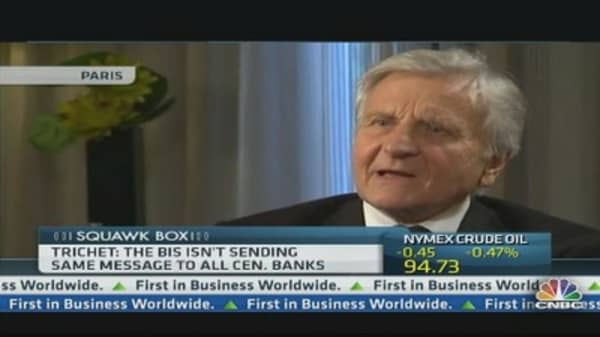As central banks around the world come under fire for their handling of the economic downturn, the former head of the European Central Bank told CNBC that central banks can only do so much to jump-start a global recovery.
"We have to pay homage to the central banks. Without their bold and swift actions, we would have known… probably a great depression," Jean-Claude Trichet told CNBC. "I think that it is perfectly legitimate that central banks [reflect] on whether what we do is still commensurate to the present difficulty."
"If [central banks] do too much, then they are only paving the way for the other partners, the governments, the parliament and the private sector, not to do their own job. It's clear that the central bank cannot do everything….They have their own responsibility but what counts now is really that the structural reforms are made in all major advanced economies, certainly Europe," he told CNBC in Paris.
The comments from Trichet, who was president of the ECB from 2003 to 2011, come at a time of global market volatility following the U.S. Federal Reserve's plan to taper its bond-buying program by the end of 2014. Trichet said markets had "over-reacted" and that Bernanke was doing the right thing.
(Read More: Roubini: Fed Exit Strategy Will Be 'Treacherous')
"I think that it was appropriate for Ben Bernanke to say well this will not last forever…but he remained very conditional in his own explanation so I think it was very well done. It was carefully crafted. That you have an over-reaction was something that we have to live with," he said. "It tells you something about the way markets are looking at things. But I am confident, that things will re-stabilize."
Despite Trichet's sanguine response, the yield on U.S. benchmark 10-year notes rose to 2.66 percent on Monday –almost a two-year high - amid investor fears over Fed tapering. However, Trichet said there was no risk of a return to 1994, when yields rose by about 2 percentage points in the course of a year in the U.S. following a Federal Reserve rate hike.(Read More: Bond Fund Outflows Hit Record Level on Tapering Fears)
"In '94, we had a decision which was taken and not pre-announced. So the markets were taken totally by surprise not on a fancy decision, but on a real immediate decision to increase rates. So it's a totally different universe… We are not in 1994 as far as I see it. But again, one has to understand that we, the central banks cannot (the Fed as well as others) cannot be the prisoner of an environment," he added.
Bernanke was trying to pave the way for a resilient economy, "an economy which will not be in an artificial fashion, but which will really earn its right to grow and to have job creation, and I really trust that it is what the Fed and Ben are looking for," Trichet said.
Central banks have most recently come under fire from the Basel-based Bank for International Settlements' (BIS) – known as the central bank of all central banks – which warned on Monday that low-interest rates and extra liquidity from central banks had bought time - rather than recovery for global economies.
(Read More: Stop 'Retarding' Economies With Ultra-Loose Monetary Policy: BIS)
BIS stated "central banks cannot do more without compounding the risks they have already created," the report added that central banks must support "needed adjustments rather than retard them with near-zero interest rates and purchases of ever-larger quantities of government securities."
Trichet cautiously supported the findings of BIS' annual report: "This is a very good message for all central banks [but it] doesn't mean that they are all in the same situation…Japan is not in the situation of Europe, which is not in the situation of the U.S."
"If you do more than what is really needed in the circumstances, you are permitting, as I said, the other partners, not to correct their imbalances or bad management, and therefore you might pave the way for future problems, which of course must be permanent preoccupation of all responsible authorities," he said.
(Read More: Make-or-Break Summer)
His comments come at a time when the euro zone and ECB has been accused of not doing enough to bolster growth and tackle high unemployment in the region. Trichet said that progress had been made but there was "no time for complacency."
"You cannot say nothing is being done. What you might say, of course, is that it's always, at least, seen in the eyes of the central banks, too slow."
(Read More: 'Uneasy Calm' in Euro Zone Bonds Could Be Over)
"What counts now is really that the structural reforms are made in all major advanced economies, certainly in Europe," he said, adding that Europe needed to correct fiscal imbalances and repair the balance sheets of the private sector. "This is work in progress, but has to be checked permanently very, very carefully," he said.
- By CNBC's Holly Ellyatt, follow her on Twitter @HollyEllyatt




